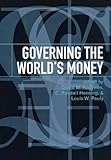Governing the World's Money / ed. by David M. Andrews, C. Randall Henning, Louis W. Pauly.
Material type: TextSeries: Cornell Studies in Political EconomyPublisher: Ithaca, NY : Cornell University Press, [2018]Copyright date: ©2002Description: 1 online resource (256 p.) : 3 line drawings, 3 tablesContent type:
TextSeries: Cornell Studies in Political EconomyPublisher: Ithaca, NY : Cornell University Press, [2018]Copyright date: ©2002Description: 1 online resource (256 p.) : 3 line drawings, 3 tablesContent type: - 9781501720628
- 332/.042 23
- HG3881 .G6185 2002eb
- online - DeGruyter
| Item type | Current library | Call number | URL | Status | Notes | Barcode | |
|---|---|---|---|---|---|---|---|
 eBook
eBook
|
Biblioteca "Angelicum" Pont. Univ. S.Tommaso d'Aquino Nuvola online | online - DeGruyter (Browse shelf(Opens below)) | Online access | Not for loan (Accesso limitato) | Accesso per gli utenti autorizzati / Access for authorized users | (dgr)9781501720628 |
Frontmatter -- CONTENTS -- PREFACE -- CONTRIBUTORS -- 1. Monetary Institutions, Financial Integration, and Political Authority -- 2. The Evolution of Political Economy -- 3. Bretton Woods and Its Competitors: The Political Economy of Institutional Choice -- 4. Toward a Broader Public-Choice Analysis of the International Monetary Fund -- 5. Currency Unions and Policy Domains -- 6. EMU as an Evolutionary Process -- 7. State Building, the Territorialization of Money, and the Creation of the American Single Currency -- 8. Why Are Territorial Currencies Becoming Unpopular? -- 9. Bounded Rationality and the World Political Economy -- 10. Webs of Governance and the Privatization of Transnational Regulation -- Index
restricted access online access with authorization star
http://purl.org/coar/access_right/c_16ec
The effective governance of global money and finance is under enormous stress. Deep changes over the last decade in capital markets, exchange rate systems, and government finances suggest dramatic shifts in the contours of monetary power, with tensions rising between the functional logic of international economics and the geographic logic of state-centered politics. Governing the World's Money assesses those tensions and the prospects for their peaceful resolution. Governing the World's Money surveys the frontiers of the global monetary system in ten original essays. Leading scholars of international relations and economics explore the evolution of the instruments available to policy officials for monetary governance. As they analyze the contemporary reordering of political authority in a market-oriented global economy, they open new pathways for the study of regional monetary integration and international institutional reform.
Mode of access: Internet via World Wide Web.
In English.
Description based on online resource; title from PDF title page (publisher's Web site, viewed 26. Apr 2024)


